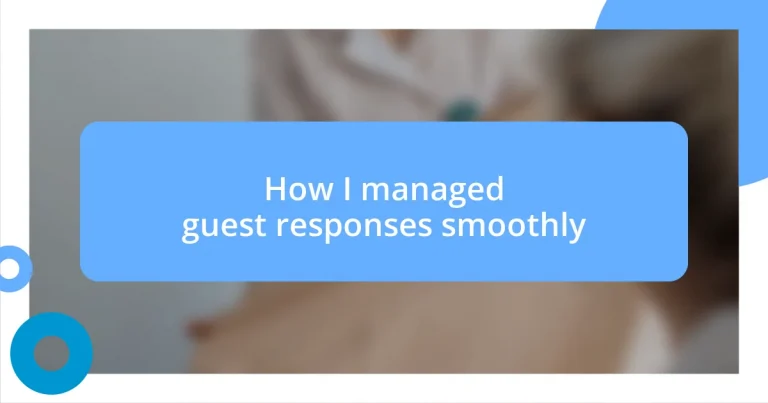Key takeaways:
- Understanding guests’ emotional responses leads to more empathetic interactions, turning challenges into positive customer experiences.
- Proactively addressing common guest concerns, such as cleanliness and noise levels, enhances satisfaction and strengthens relationships.
- Following up with guests fosters trust and loyalty, while utilizing feedback can drive significant improvements in services offered.
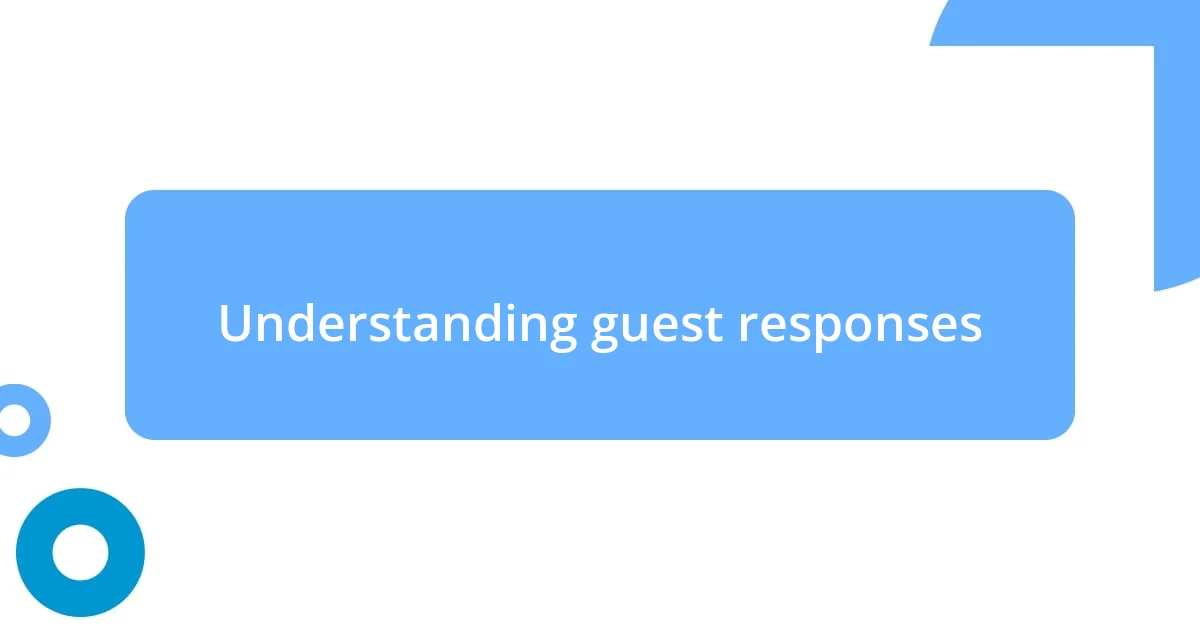
Understanding guest responses
When I first started interacting with guests, I quickly learned that their responses often reflect deeper emotions. For example, when a guest expressed frustration over a delayed check-in, I recognized it wasn’t just about the wait; it was about trust and the anticipation of their experience. Understanding that helped me approach the situation with empathy and resolve it more effectively.
It’s fascinating how context can dramatically shape guest responses. I remember a time when a guest left a glowing review after a minor issue was resolved swiftly. This made me ponder: is it the issue itself that matters, or how we address it? By embracing their feedback, I’ve realized that even negative experiences can lead to positive outcomes when handled with care.
Listening actively to guests is crucial in deciphering their actual needs. During a particularly busy season, I focused on understanding not just the words guests shared, but also their body language—all those subtle cues. This experience taught me that addressing their unspoken concerns can make a massive difference, turning a challenge into a memorable customer service encounter. Have you ever noticed how a simple acknowledgment can change the entire tone of a conversation?
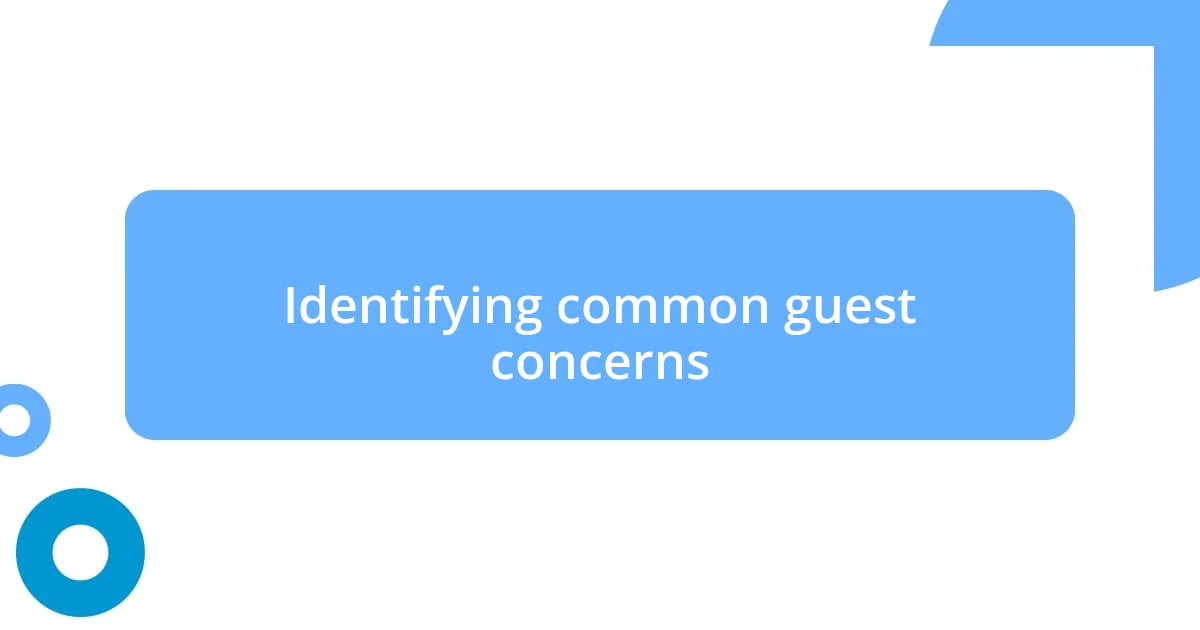
Identifying common guest concerns
As I delved deeper into guest interactions, I began to notice patterns in their concerns. Addressing these common issues proactively not only created stronger relationships but also streamlined my response strategies. I recall a situation where multiple guests expressed anxiety over high noise levels during their stay. By recognizing this concern, I was able to implement soundproofing measures in specific rooms, significantly enhancing guest satisfaction.
Here are some prevalent guest concerns I’ve identified:
- Cleanliness: Guests often prioritize a spotless environment and may express dissatisfaction if standards are not met.
- Check-in and check-out processes: Delays or confusion here can lead to irritation.
- Noise levels: As I learned, disruptions from adjacent rooms or common areas can be a significant issue.
- Staff responsiveness: Guests appreciate quick and friendly assistance, and delays can lead to frustration.
- Room amenities: Guests frequently express disappointment when expected amenities (like Wi-Fi or toiletries) are lacking.
These insights helped me shape a more responsive environment. By addressing these concerns upfront, I aim to elevate the overall guest experience.
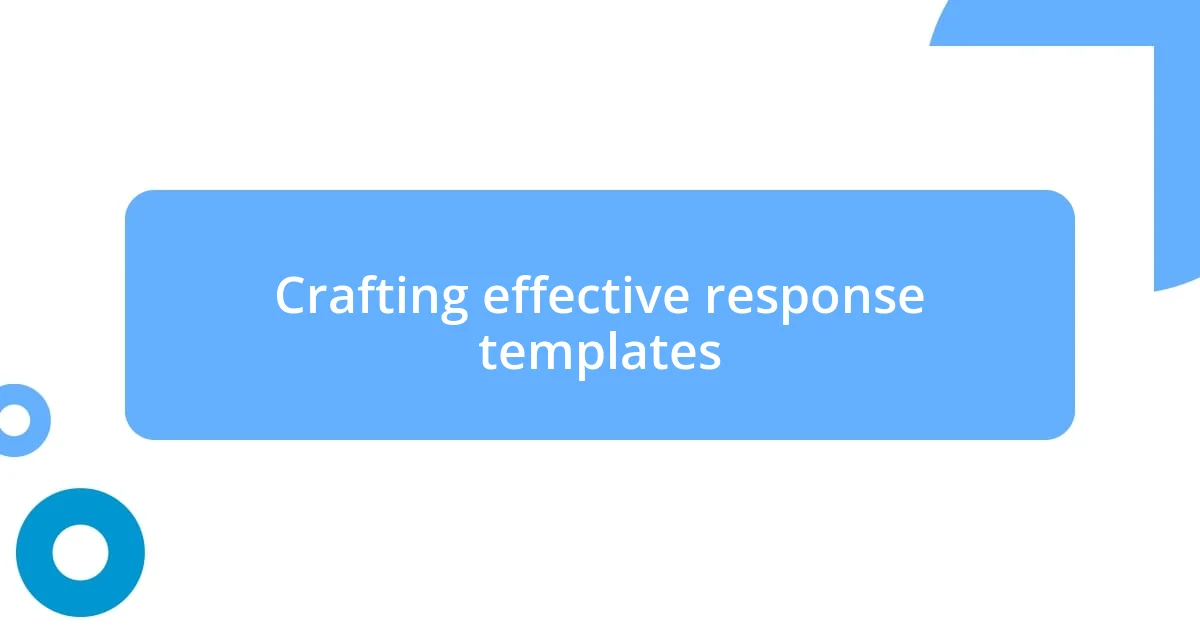
Crafting effective response templates
When crafting effective response templates, I’ve found it crucial to maintain a balance between personalization and efficiency. There was one instance where a guest struggled to navigate our amenities. Instead of sending a generic response, I customized my reply by referencing specific features that could enhance their experience. This approach not only resolved their confusion but also fostered a sense of connection—something a template alone could never achieve.
One key to developing these templates is using clear language that reflects your brand’s voice while still addressing the guest’s concerns. I once created a response template for apologies related to service delays. By incorporating warm language and offering a genuine acknowledgment of the inconvenience, I noticed guests responding more positively, often appreciating the thoughtfulness behind my words.
Additionally, I recommend developing a comparative table for different response types, which can help in honing in on the right template for any situation. Visualizing the nuances can make a world of difference in managing diverse guest responses effectively.
| Response Type | Characteristics |
|---|---|
| Apology | Empathetic tone, acknowledgment of guest’s feelings |
| Informational | Clear, concise, focused on providing solutions |
| Thank You | Gratitude-focused, reinforces appreciation for guest loyalty |
| Feedback Request | Invites collaboration, shows openness to improvement |
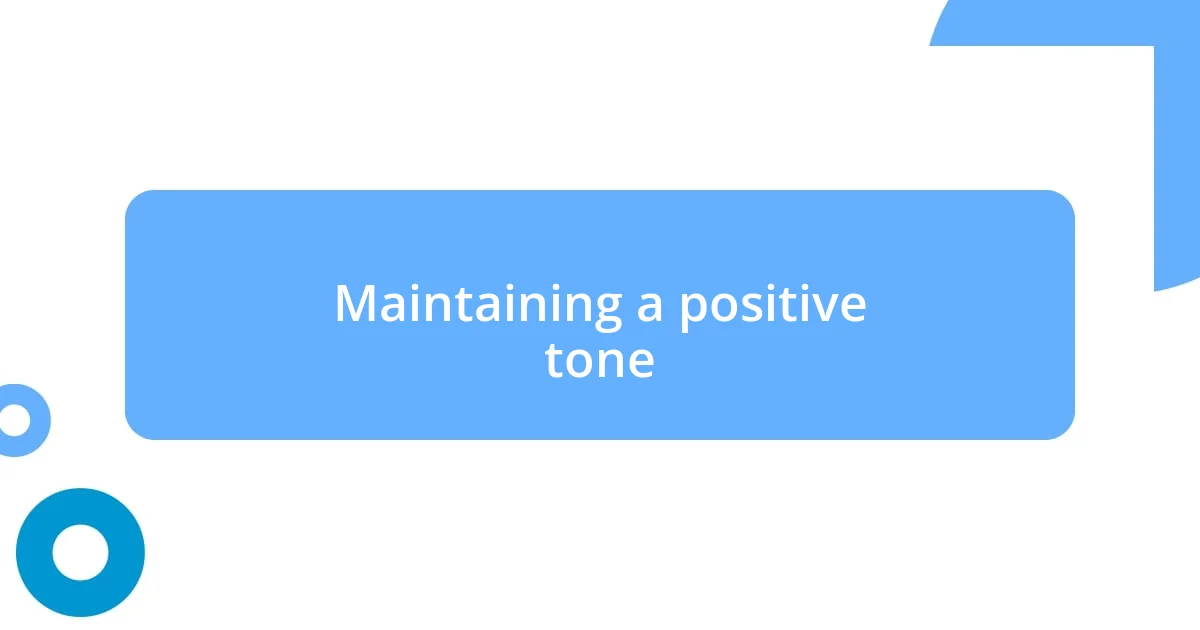
Maintaining a positive tone
Maintaining a positive tone is vital in guest interactions. I remember a time when a guest expressed frustration about being assigned a noisy room. Instead of mirroring that negativity, I chose to acknowledge their feelings and quickly arranged a room switch. I could see the relief in their eyes when I said, “I completely understand how disruptive that must be. Let’s get you settled in somewhere quieter.”
It’s interesting how the words we choose can either uplift or dishearten a guest. During a particularly busy weekend, a guest complained about the delays at check-in. I greeted them with a warm smile and said, “I truly appreciate your patience. We’re doing everything we can to get you settled as quickly as possible.” That small gesture turned what could have been a sour experience into an opportunity for positive rapport. Can you feel the difference a smile can make?
In my experience, infusing positivity into written communications is equally important. When crafting replies to guest inquiries, I aim for an upbeat tone. For example, when responding to a guest who inquired about our amenities, instead of saying, “We don’t have that feature,” I would say, “While we currently don’t offer that, I’m excited to share our amazing alternatives that you might find delightful!” This approach not only informs but also opens the door for a more engaging conversation.
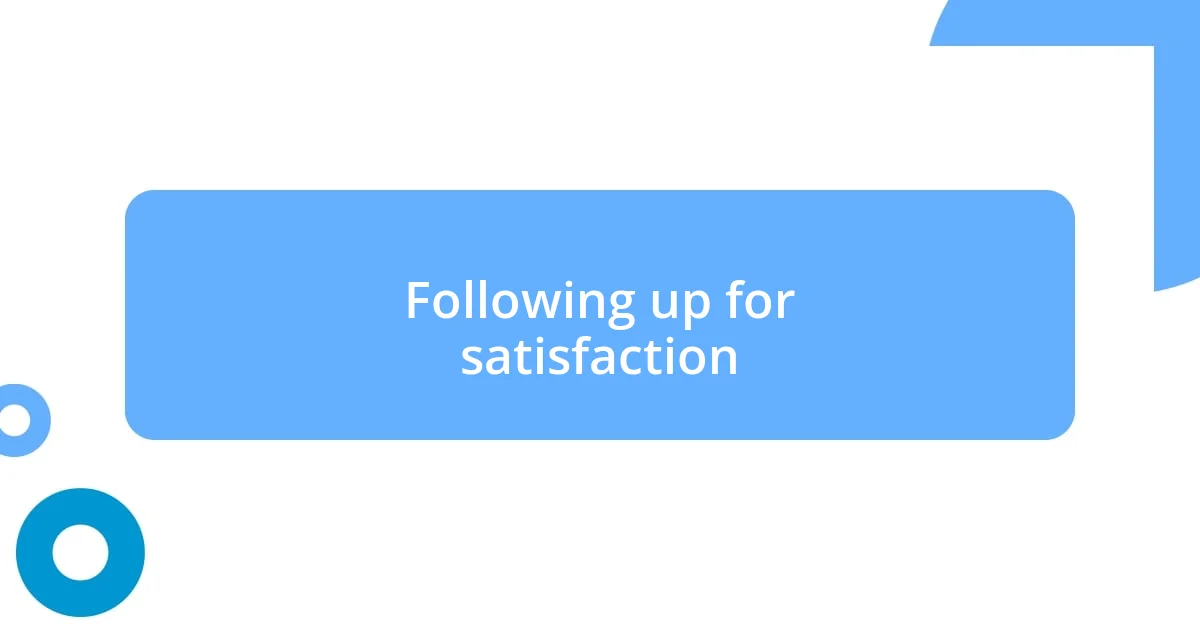
Following up for satisfaction
Following up with guests to ensure their satisfaction has always been a priority for me. I remember a time when a guest left a review mentioning a minor issue with cleanliness in their room. I reached out to them personally, expressing my genuine regret and asking if their stay improved after I addressed the matter. Their response was warm and appreciative, and it highlighted just how impactful a simple follow-up can be in fostering trust and loyalty.
There’s something about checking in on a guest after their visit that feels deeply rewarding. For instance, I often send a personalized email a week after their stay, inquiring about their experience. Recently, I had a family who celebrated a birthday during their visit. When I followed up, they shared how the little surprises we arranged made the celebration memorable. I felt a wave of joy knowing that my effort contributed to their happiness. Isn’t it incredible how a thoughtful follow-up can turn a good experience into a great one?
In my experience, the follow-up isn’t just about addressing concerns; it’s also about advocating for a deeper connection. I once had a guest who had shared feedback regarding our dining options. After implementing a few changes, I reached out to inform them and invite them back to try the new menu. When they returned, they were genuinely excited to experience the updates. Moments like these show how following up can bridge the gap between service and relationship—in a way that truly enriches both parties.
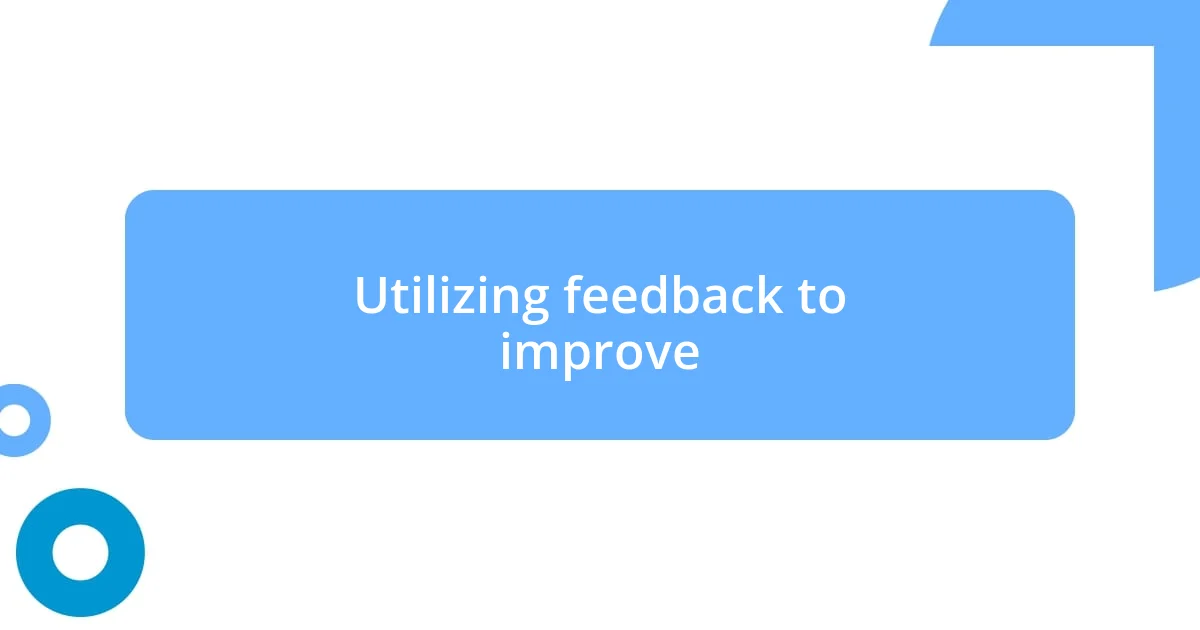
Utilizing feedback to improve
Utilizing feedback to enhance the guest experience has been a game changer for me. Not long ago, I received a suggestion from a guest about revamping our breakfast options. Initially, I felt a twinge of defensiveness, but then I realized this was an opportunity. After discussing their ideas with the kitchen team, we incorporated some new healthy choices. When I saw that guest’s delight upon their next visit, it struck me how powerful feedback can be in driving positive change.
I remember an instance where a guest pointed out that our Wi-Fi was slow. Instead of brushing it off, I took that seriously and gathered more data. I reached out to several guests for their experiences, and it turned out that this was a widespread issue. By addressing it promptly with our IT department, we improved the service significantly. Sometimes, it takes a little discomfort to steer the ship in a better direction, and I can tell you, the gratitude we received afterward was worth every bit of effort.
Feedback isn’t just a tool; it’s a lifeline for better service. I genuinely believe that when guests share their thoughts, they’re inviting us into a conversation about how we can do better. One time, a family highlighted their desire for more evening activities for children. Instead of merely thanking them, I dove deep into brainstorming sessions, leading to game nights that have since become a staple. It makes me wonder: how often do we miss the chance to connect deeply with our guests simply by overlooking their insights?
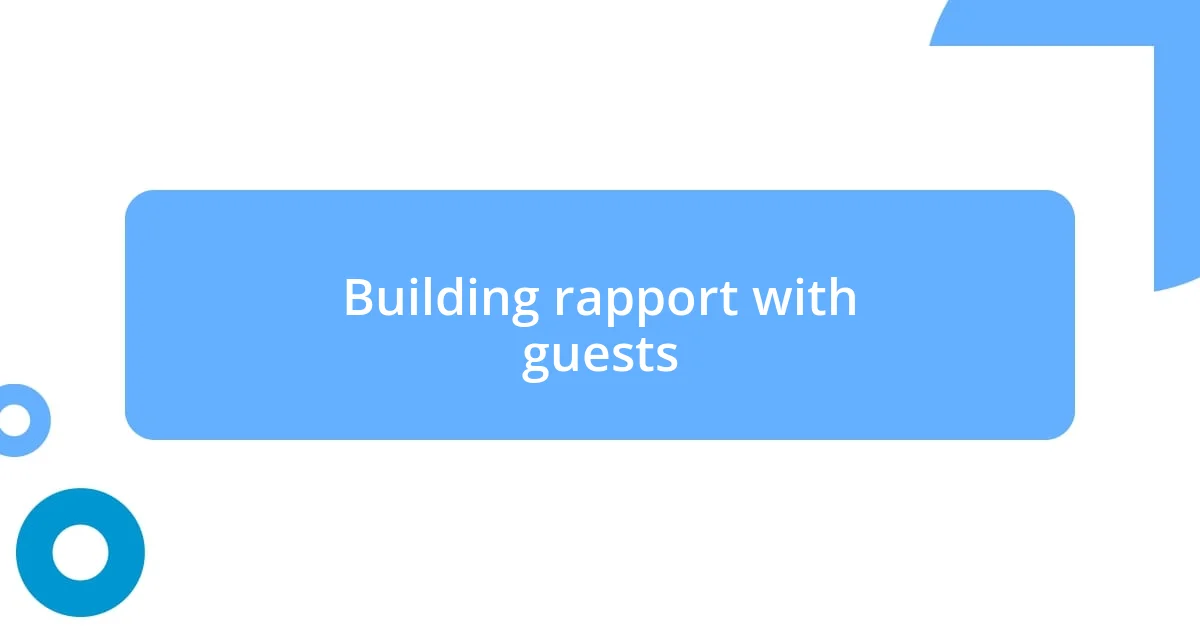
Building rapport with guests
Building rapport with guests often begins with small gestures that communicate genuine care. I once found myself in a conversation with a couple celebrating their anniversary. As we chatted, I learned about their favorite wine. The next evening, I surprised them with a bottle waiting in their room, along with a handwritten note. Seeing their delighted reactions reminded me how simple acts of thoughtfulness can create lasting connections.
Humor can also play a significant role in establishing rapport. During a particularly hectic check-in, I noticed a guest looking a bit stressed. I quipped that our check-in process was the “fast pass to relaxation,” and it drew a genuine laugh from them. That brief moment not only lightened the atmosphere but transformed the interaction into one of camaraderie. It’s fascinating how a little levity can dissolve barriers and foster a sense of community.
At the end of the day, authenticity is the bedrock of rapport. I recall a guest who seemed apprehensive about a specific service I offered. Rather than pushing it, I candidly shared my own experience with it, expressing my honest thoughts. This open approach changed the way they viewed not just the service but our relationship as well. It made me wonder: isn’t it the truest connections that often leave a lasting impression on both the guest and the host?












